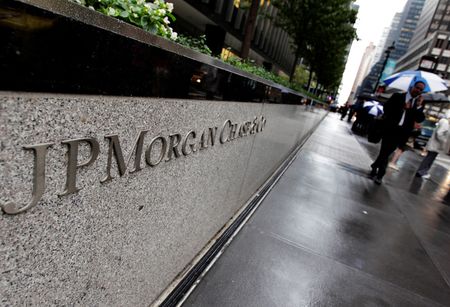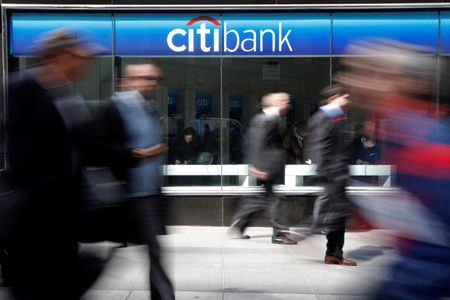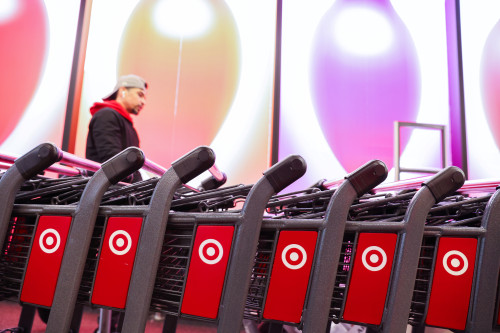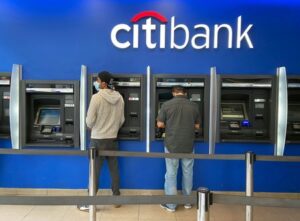NEW YORK (Reuters) -Major U.S. banks said on Friday higher interest rates boosted profits, sending shares sharply up, even though they said the economy was slowing and saw signs of some caution in consumer behavior.
The Federal Reserve’s aggressive monetary policy has made it harder for consumers and businesses to take on loans and repay debt while the tightening is prompting banks to slow the flow of credit and beef up cash levels after the panic in March when Silicon Valley Bank collapsed.
Citigroup CEO Jane Fraser said she was seeing a continued deceleration in spending, indicating “an increasingly cautious consumer.”
The third-largest U.S. lender said delinquency levels were still low compared to historical levels but it set aside more money to cover souring loans.
Wells Fargo said it was seeing charge-offs, or loans written off, increasing in its credit card portfolio. Average commercial and customer loans were down from the second quarter as higher rates and a slowing economy weakened loan growth, Wells Fargo CEO Charlie Scharf said on an analyst call.
“While the economy has continued to be resilient, we are seeing the impact of the slowing economy with loan balances declining and charge-offs continuing to deteriorate modestly,” said Scharf in the bank’s press release.
Wells Fargo said on a conference call that customer decisions on how fast they want to invest in their businesses was coming through in loan growth, although credit quality is still good.
Regional lender PNC Financial Services, meanwhile, reported higher consumer loan delinquencies.
However, the outlook was not as negative as previously thought for some banks. JPMorgan Chase said that its economists had revised their outlook for the economy early this quarter to modest growth for a few quarters into 2024, rather than showing a mild recession, which fed into its decision to release net reserves of $113 million.
JPM said in its earnings call that consumer spend growth had now reverted to pre-pandemic trends with people spending down savings.
“Currently, U.S. consumers and businesses generally remain healthy, although consumers are spending down their excess cash buffers,” said Jamie Dimon, JPMorgan Chairman and CEO.
HIGHER EARNINGS, LOWER DEPOSITS
Banks generally showed higher net interest income (NII), or the difference between what they earn on loans and pay out on deposits, as they benefited from higher interest rates.
JPMorgan, Citigroup and Wells Fargo, which are ranked as the first, third and fourth biggest U.S. lenders, respectively, also increased their outlook for NII.
Eric Kuby, chief investment officer at North Star Investment Management Corp in Chicago, “what you are seeing is the big banks with really diverse businesses had quite good earnings.”
Kuby said his firm owns JPMorgan shares.
Dimon said that the results benefited from “over-earning” on net interest income although that would normalize over time. JPM said on its analyst call that it did not “consider this level of NII to be sustainable.”
However PNC’s NII declined. The bank said that higher yields on interest-earning assets were more than offset by increased funding costs.
JPMorgan Chase, Wells, Citi and PNC all reported a decline in average deposits.
Shares of JPMorgan, Wells Fargo, and Citi all rose more than 3% although PNC fell. The KBW index of bank shares, which includes regional lenders, was up.
“Bank stocks have been priced for nothing but bad news for a while and have significantly under performed,” said Rick Meckler, partner, Cherry Lane Investments, a family investment office.
“Today is truly a relief rally where investors see the picture for the major money center banks is not as negative as they feared, particularly their outlook.”
(Reporting by Saeed Azhar, Nupur Anand, Lewis Krauskopf, Tatiana Bautzer and Sinead Carew in New York; Niket Nishant, Manya Saini, Noor Zainab Hussain, Jaiveer Shekhawat and Pritam Biswas in Bengaluru; Ann Saphir in San Francisco; editing by Megan Davies, Lananh Nguyen, Michelle Price and Nick Zieminski)







